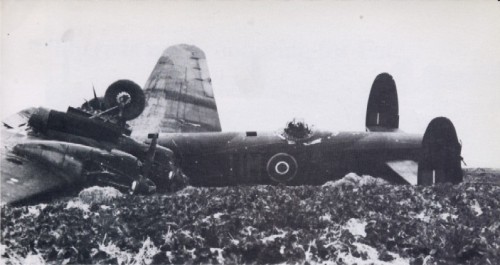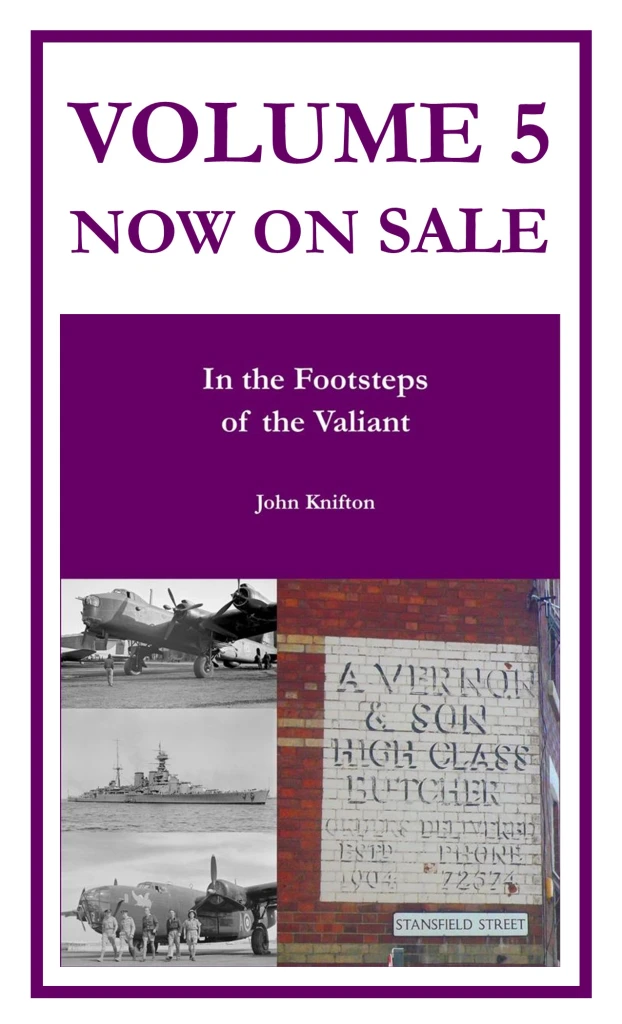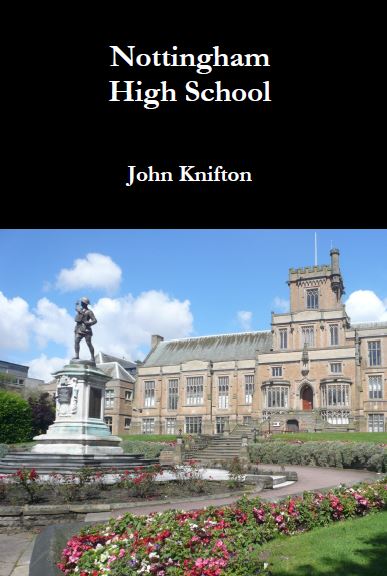Last time I showed you some of the poems which were published in the school magazine, the Nottinghamian, during the period of 1922-1946, although, to be honest, most of them were about the Second World War. Many of the poems are of a remarkably high standard, and give us quite an accurate snapshot of how boys saw events unfolding in an increasingly terrifying adult world.
During the war, countless thousands of children from British cities were evacuated to the peaceful countryside. Frank Alan Underwood of 51 Charnock Avenue, Wollaton Park, wrote this first poem, “Evacuated”, which appeared in April 1942. Frank was the son of a lecturer at the University of Nottingham. He left the High School in July 1943. He went to university with a State Bursary for Science:
EVACUATED
O for the City Smells once more,
For the asphalt under the rain,
For the harsh, unceasing, clanging roar
Of city streets again.
I am tired of cows and senseless sheep :
All is too quiet to let me sleep ;
But think of the harsh-hushed city din
That comforts me as sleep steals in.

I don’t know whatever happened to Frank, although I did find that a paper entitled “Textures in Metal Sheets” was issued in 1962 by Dr FA Underwood. Further googling yielded further results in the same field.
As the war dragged on, the shops seemed to have very little to sell. This is reflected in a poem entitled “Triolet” by Frederick Brian Perkins, a member of the Second Form A who lived at “Kingsley” in Egerton Road in Woodthorpe. His father was a timber merchant
What is a “Triolet”? Well, it’s an eight-line poem (or stanza) with a rhyme scheme of ABaAabAB. It is apparently very similar to a rondeau. Here’s one:
TRIOLET
In the shops nowadays,
There’s little to buy ;
We alter our ways ;
In the shops nowadays.
They have empty trays ;
And we all stand and sigh,
In the shops nowadays,
There’s little to buy.
The same tale of woe had been told by Donald Arthur Gospel of the Upper Fifth Form Classical in April 1942. Donald was the son of a departmental manager and lived at 70 Whitemoor Road in Old Basford:
VARIATIONS ON A WELL KNOWN THEME
Sing a song of chocolate:
The shoppers formed a queue,
Four and twenty people—
Soon everybody knew ;
When the shop was opened
The folk began to push ;
Now wasn’t that a silly thing,
To start another crush.
The profiteer was in his house,
Counting out his money ;
His friend was in the Black Market,
Selling jars of honey.
The folk were paying double
To have some extra cheese,
When off they went in a “Black Maria,”
Despite all their pleas.
In case you were unaware, this poem is a beautiful re-telling of the old nursery rhyme, “Sing a Song of Sixpence”:
 You can find the lyrics and a link to the video with the tune, HERE
You can find the lyrics and a link to the video with the tune, HERE
Donald Gospel, our author, seems to have fought in the Indian Army in World War Two, moving from there in 1945 to be in the Sherwood Foresters and then the Queen’s Regiment in 1949. Donald passed away in 1995.
There was very little faith that there would be anything in the shops, or indeed, any end to the black marketeers, even eighteen months after the war’s end.
This poem was written by James Derrick Ward, born on December 19th 1933, who lived at 22 Windermere Road in Beeston. His father was the Chief Chemist in a Works Laboratory, possibly connected with one of the military depots at nearby Chilwell. The poem appeared in the Nottinghamian of December 1946. James left the High School in August 1950.
NOVEMBER 5TH, 1946
No squibs, no rockets,
Money in pockets
No fireworks in shop,
My spirits drop.
November.
No clothes for “Guys,”
Oh, hear my sighs !
No crackers leap,
My sorrow’s deep.
November.
No fiery wheels,
Nor thundery peals,
No happy night,
No bonfire bright.
November.
Fortunately, when victory had come almost eighteen months previously, there had been no shortage of fireworks in Moscow. Or people, if you look closely :

A lot of the High School boys had brothers or fathers in the forces. A rather pessimistic ditty occurs quite frequently in the Nottinghamian, with variations, regarding which particular branch of the forces and whether the location was the High School or a college at Oxford or Cambridge. Here we go. The first two refer to an Oxford or Cambridge college, where the main entrance is permanently manned by the college porters :
Nine little Undergrads, at the Porters’ Gate,
One is a sailor so now there are eight.”
And, a very similar poem:
Nine little Undergrads, at the Porters’ Gate,
One joined Bomber Command so now there are eight.”

But there is definitely one little poem which refers specifically to the actual High School in Nottingham:
“Nine Nottinghamians,
At the Forest Road gate,
One went to Bomber Command,
And then there were eight.”

And so on. And sadly, so true.






There is some very, very clever rhyming here. And irony and humour and pathos. A brilliant post John.
Thank you so much. I agree with you about the standard of the poems. Indeed, I did wonder whether every single poem was written by a young boy of such tender age, but I suppose that they would have taken them to their English teacher who would have pointed out the errors and offered remedies. And as you say, the result is some really impressive poems.
The boys definitely had a way with words. They not only spoke their opinions, but what they saw and felt. Descriptive!
Thank you. These boys would have been the cream of the academic crop and were very often the sons of fathers with very high level, and very important, jobs. And many of the boys themselves would go on to great things.
It shows.
A fine selection, John. Memories of rationing triggered, too
Thank you Derrick. I was born in 1953, and I looked up the end of rationing in Britain and it said:
“Fourteen years of food rationing in Britain ended at midnight on 4 July 1954, when restrictions on the sale and purchase of meat and bacon were lifted.”
For obvious reasons I don’t remember it, but I do remember my Dad’s story of how a young member of the family, stationed near the village, came to my grandparents’ house during the war years, and ate all of their week’s bread and meat ration in just one meal.
I can well believe that.
An interesting selection of poems, John, that reflects the times well. When I read “Variations On a Well Known Theme,” I immediately picked up the rhyme for “Sing a Song of Sixpence.” Cleverly done 🙂
Yes, it certainly is. That’s one of my favourite nursery rhymes. I’ve just been trying to work out what it means but nobody has the foggiest idea apparently.
It took me a long time to work out that the Beatles had produced their own version in “Cry Baby Cry” on the White Album. You can find all of the lyrics if you google “beatles the King of Marigold was in the kitchen”.
Some great poems. Interesting to read what they were thinking at the time.
It certainly is. I don’t think that there is any better source for getting direct opinions than a 14 or 15 year old boy. I used to be a teacher, and they certainly don’t hold back!
These highlight the feelings of wartime Britain well. Franks “Evacuated” shows the effect of moving from an urban environment to a rural one, whilst considered idyllic, does have its down sides. The sounds, smells and sights of a city are comfort to some but a pain to many others! Very cleverly done poems.
Thank you, I’m glad you enjoyed them. I suppose that I will have taught plenty of boys who were very, very clever, but nowadays those brain cells are invariably directed towards science for a medical career, or the law for a very rich one. Back in the 1930s, there would have been much greater regard for being a writer, and particularly, a poet.
A declining art I suspect, being replaced by programme writers!
The poem by Frank made me smile. Such thoughts are true for all times. I was staying with my aunt when going to college in Bombay. Her house was near the railway tracks. The local trains were running from morning to midnight. The sound was a bit too much. But I got used to over the months and even missed it when I got married and came to our small town, where the only sound we hear is that of insects at night. Now I am used to this 🙂
I’ve never slept near trains, but I can imagine that you would eventually get used to it. Insects must be very pleasant, although it’s too cold in England to get very many.
The one thing that we were unable to get used to was a neighbour who had a big dog that barked 24 hours a day. The problem was that the noise was very loud and unexpected. Eventually there were enough complaints for the council to make him get rid of it.
Very nice poems, they tell us so much. Thank you for sharing.
I’m glad you enjoyed them!